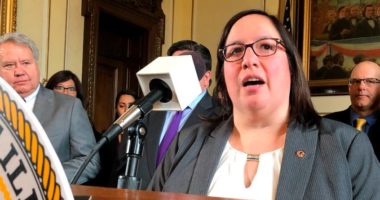Show Me The Money: Senate Bill Wants To Know How Much Revenue Online Casinos Would Bring


A Senate resolution from Illinois seeks to determine the potential tax revenue that the status might have received if online casino gambling had become legal in February 2020.
The resolution is sponsored by State Sen. Cristina Castro (shown above), as per the synopsis.
“Should Illinois have legalized online gambling from February 28, 2020, it is recommended that the Commission on Government Forecasting and Accountability provides the Illinois Senate with revenue estimates from a potential privilege tax.”
The document needs to be turned in by October 1, 2021, as per the associated costs. This deadline may hint at potential negative impacts on online casinos this session, as suggested by the tea leaves.
That being said, this likely bodes well for the longevity of online casinos in Illinois, given the evident interest from various members of the legislature.
The report identifies Feb. 28, 2020, as a significant date due to the impact of the COVID-19 pandemic on brick-and-mortar casinos in Illinois.
Here is another important passage from the resolution:
The isolated nature of online gaming, which makes it partially resistant to pandemics, has led some Illinois residents to avoid leaving their homes for non-essential activities. This fear has also compelled many casinos to shut down for the protection of their customers and staff.
The report also investigates the influence of specific luxury tax rates on income. It solicits estimates for various privilege tax rates, ranging from 12% to 16%.
In the Illinois House and Senate, there are costs for online casinos.
Online entertainment expenses exist in the Illinois House and Senate, however, the legislative session is nearing its end.
The Internet Gaming Act, also known as HB 3142, has received increased attention and was a topic of discussion during the House Executive Committee Hearing in April. This Act proposes a 12% privilege tax on revenues from internet gaming.
This also permits online poker in Illinois, capped at 36 skins. An in-person registration requirement lasting six months is mandated for online casino betting, which appears to be more straightforward than in the Sports Wagering Act.
What might the document reveal?
When observing the nationwide trend, it’s difficult to overlook the impressive figures other states are generating from online casinos.
Consider Michigan, for example. In April, operators in MI made a profit of $94.9 million, which generated $23 million in state and local tax revenue.
Online casinos have only been allowed in Michigan for a brief period and the industry is still in its developmental stages.
When you juxtapose those numbers with the revenues from Illinois sports betting, there’s simply no comparison.
March was the most successful month for sports betting in Illinois, breaking all-time records in handle, operator revenue, and tax revenue. Only New Jersey and Nevada had higher handles in the same month.
In its most successful month to date, Illinois sports betting generated slightly over $7 million in state and local tax revenue.
Indeed, the sports gambling industry in Illinois is more prosperous than that in Michigan.
Therefore, it is logical to assume that the Land of Lincoln would be running even higher virtual blackjack numbers than its Midwest counterpart if it didn’t require in-person registration.







